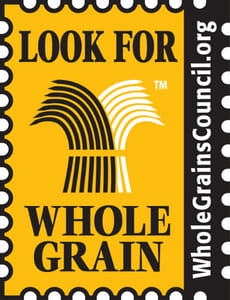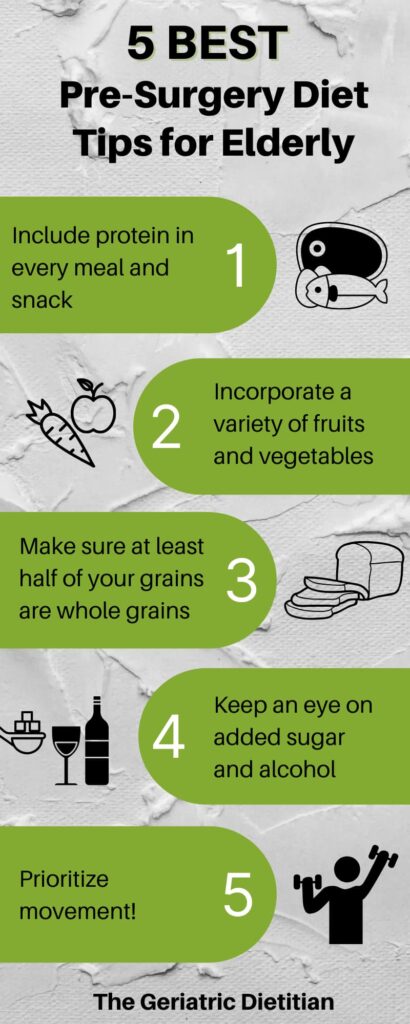5 Best Pre-Surgery Diet Tips for Elderly
“5 Best Pre-Surgery Diet Tips for Elderly” was written by Lauren Whitman, RDN & edited/reviewed by Aly Bouzek, MS, RDN.
Having surgery can be stressful – whether you’re the patient, or the patient is an older adult that you care for. The idea of surgery may be scary, but thankfully there are things you can do to prepare!
In the weeks and days leading up to surgery, it’s important to focus on good nutrition and movement. Surgery can add stress to your body, and it needs a lot of energy to heal and recover.
You can think of surgery like a marathon, and you’ll want to prepare for the big event by getting the proper nutrients and exercise before the big race.
These nutrition tips are important to follow before and after surgery and can even be followed year-round to maintain a healthy lifestyle.
You may find other resources recommending specific micronutrients and supplements – but don’t worry – if you are eating a variety of protein, fruits, vegetables, dairy, nuts/seeds, and whole grains, then you’ll get all the nutrients you need!
Pre-Surgery Diet Tips
Pre-Surgery Diet Tip #1: Include Protein in Every Meal and Snack
Protein is a building block for muscle, helps maintain strong bones, and helps create important enzymes and hormones in your body. You want to go into surgery feeling strong and energized, and you can do that by eating enough protein.
Not only is protein important for muscle and bone, but it is also a very satiating nutrient, meaning that when you eat protein, you will feel satisfied and stay fuller for longer.
Aim to include protein in every meal and snack. Great protein foods are chicken, lean beef, turkey, eggs, dairy, and soy products.
It is recommended that most older adults consume 1-1.2 grams of protein per kilogram of body weight per day. Try spreading out your protein throughout the day and try to include a little bit with each meal and snack.
Check out our article, Protein Requirements for Older Adults, to learn more!
If you’re vegetarian or vegan and are having a hard time finding protein ideas, then check out our article on Easy High Protein Vegan Meals.
Pre-Surgery Diet Tip #2: Incorporate a Variety of Fruits and Vegetables
Fruits and vegetables have so many health benefits because they are full of vitamins, minerals, and fiber. We recommend eating a variety of fruits and vegetables so you can get everything they have to offer. Fresh, frozen, and canned fruits and veggies are all great sources.
If raw fruits and vegetables are hard for you to eat, you can try cooking them, putting them in soups, or tossing them in a blender to make smoothies. There are lots of ways to eat more fruits and veggies. Don’t be shy about getting creative!
Pre-Surgery Diet Tip #3: Make Sure at Least Half of Your Grains are Whole Grains
Unlike refined white grains, whole grains are full of good nutrients like fiber, iron, zinc, magnesium, copper, antioxidants, and B vitamins.
Studies have shown that whole grains can reduce your risk of certain diseases and can improve common digestion problems like constipation. (1)
Examples of whole grains are:
- 100% whole wheat breads and pastas (check the label to see if “100% whole wheat” is the first ingredient)
- Brown rice
- Barley
- Quinoa
- Oats
You can also look for the yellow and black “whole grain stamp” on packages, which indicates the food is a good source of whole grains.
Filling up on whole grains in the weeks and days before surgery may help you recover faster from surgery.

Pre-Surgery Diet Tip #4: Keep an Eye on Extra Sugar and Alcohol
Notice on how much extra sugar, caffeine, and alcohol you are eating and drinking. Sugar is okay through natural sources like fruit, but you want to limit extra sugar in sweetened beverages, candy, and desserts before surgery.
It’s okay to enjoy sweet things from time to time, but make sure you are eating protein, fruits, vegetables, and whole grains too!
Alcohol puts older adults at a greater risk of falls and injuries. (2) Also, alcohol may negatively affect other health conditions and can increase inflammation.
It is important to limit alcohol intake to 2 or less drinks per day for males and 1 or less drinks per day for women, especially in the weeks and days before surgery. (2)
Pre-Surgery Diet Tip #5: Prioritize Movement!
Exercise has many great benefits for older adults, including improved bone strength, balance, cognition, and quality of life. (2) It’s never too late to start exercising, but be sure to start slow, and don’t push yourself too much before surgery.
Try to incorporate movement after surgery, too. Talk with your doctor about what exercises are safe. Check out our article on Enhanced Recovery After Surgery for Elderly to learn more about the importance of movement immediately following surgery.
Infographic: 5 Best Pre-Surgery Diet Tips for Elderly

Days Before Surgery
In the days leading up to surgery, it is especially important to follow the tips we’ve discussed: eat lots of protein, fruits, vegetables, whole grains, limit sugar and alcohol, and exercise! You’ll want to make sure that you’re well hydrated as well.
Ask your doctor questions about how to best prepare before surgery, aside from eating a healthy diet and exercising. They may have more specific tips, depending on the type of surgery you are having and your current health status.

Post-surgery
You may have nausea and/or a loss of appetite after surgery – this is a common side effect of pain medication. Refueling your body after surgery is important to speed up recovery and get you feeling your best.
If you have a loss of appetite, try eating smaller meals more often.
Although you may be resting more after surgery, your body is using a lot of energy and nutrients to recover. It’s especially important to give your body the nutrition it needs to heal.
Include fiber in each meal and snack. Fiber can come from fruits, vegetables, beans, nuts, seeds, and whole grains. It will help your digestion and bowel movements return to normal. Drink enough water with your fiber-foods to avoid constipation and diarrhea.
Just like before surgery, make sure you are including protein in each meal after surgery. Protein helps re-build and maintain muscle mass and bone structure.
This is especially important while you are on bed rest and start working towards mobilization again.

Be a Strong Advocate
You are your best advocate! Ask your healthcare team about surgery guidelines and recommendations for before and after surgery.
If you feel there is not enough information on good nutrition and movement, be sure to ask for more resources.
Additional Tips for Elderly Having Surgery
You can get rid of some stress by getting familiar with what to do before and after surgery, and it may also be help to know what will happen during surgery.
Prepare any questions for your doctor before your appointment, and it may be helpful to write them down.
In general, people find both verbal and written instructions the most helpful. Ask for written information if your doctor does not already provide it.
Resources:
- The Nutrition Source. Harvard. https://www.hsph.harvard.edu/nutritionsource/what-should-you-eat/whole-grains/.
- Dietary Guidelines for Americans: 2020-2025. https://www.dietaryguidelines.gov/sites/default/files/2021-03/Dietary_Guidelines_for_Americans-2020-2025.pdf.

Pre-surgery dieting isn’t uncommon, though there are certain steps to follow when it comes to the elderly. Great insight shared here!